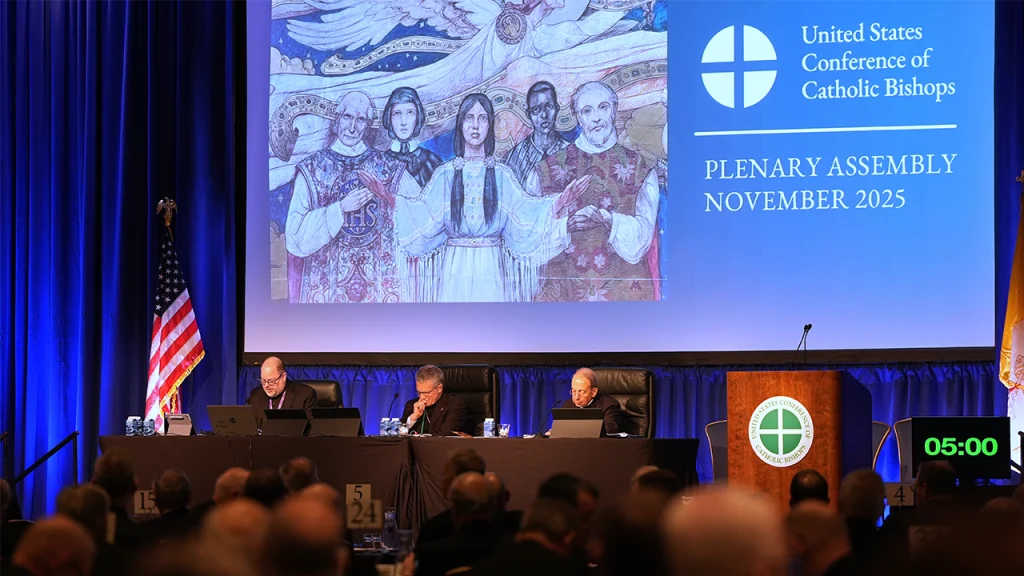U.S. Catholic Bishops Take Firm Stance on Transgender Care and Immigration
In a significant decision that impacts millions of Americans, U.S. Catholic bishops voted overwhelmingly to prohibit gender transition treatments at Catholic hospitals across the country. Meeting in Baltimore, the bishops formalized a years-long process addressing transgender care options, effectively banning hormonal, psychological, and surgical treatments aimed at gender transition. This decision carries substantial weight considering that more than one in seven patients in the United States receive care at Catholic health facilities daily, which in some regions serve as the only available medical centers. Each bishop will now have autonomy in implementing these new directives within their respective dioceses, though most Catholic health institutions had already refrained from offering such treatments in alignment with traditional church teachings.
The bishops’ decision reflects a broader Catholic perspective on gender as articulated in recent Vatican documents. Bishop Robert Barron of Minnesota’s Winona-Rochester diocese emphasized during discussions that “it’s very important the church makes a strong statement here” regarding what the church terms “gender ideology.” The new directives incorporate previous Catholic teachings, including a 2023 doctrinal note titled “Moral Limits to the Technological Manipulation of the Human Body,” which stated that Catholic healthcare services must not perform interventions aimed at transforming sexual characteristics. Despite this institutional position, the Catholic Health Association affirmed that transgender individuals would continue to be welcomed and treated “with dignity and respect,” emphasizing the moral obligation to serve everyone, particularly those who are marginalized, in accordance with Catholic social teaching.
The bishops’ stance has met with mixed reactions within the broader Catholic community, highlighting the complex relationship between official church teaching and lived experiences. Michael Sennett, a transgender man active in his Massachusetts parish who serves on the board of New Ways Ministry, pointed out that “for many trans people, gender-affirming care is what makes life livable” and that many transgender Catholics view transition as “a spiritual imperative.” Francis DeBernardo, executive director of New Ways Ministry, which advocates for LGBTQ+ inclusion in the Catholic Church, noted that many transgender Catholics consider transition necessary to “living as authentic people in the way that they believe God made them.” This perspective illustrates the tensions between institutional positions and pastoral approaches within Catholicism, where some parishes and priests welcome transgender Catholics while others adhere more strictly to traditional teachings.
Notably, as Catholic bishops deliberated on gender identity issues, leaders from several progressive religious denominations issued a statement supporting transgender people. The joint declaration—signed by heads of the Unitarian Universalist Association, the Episcopal Church, the Union for Reform Judaism, and the Presbyterian Church (U.S.A.), among others—directly countered what they called a “disgraceful misconception that all people of faith do not affirm the full spectrum of gender.” Their statement affirmed transgender individuals as “created in the image of God—Holy and whole,” providing a stark contrast to the Catholic bishops’ position and illustrating the diversity of religious perspectives on gender identity in contemporary American society. This divergence of religious viewpoints reflects broader societal debates about gender, medical care, religious liberty, and human dignity.
Beyond gender-related issues, the bishops also addressed immigration concerns, approving a “special message” that criticizes the Trump administration’s immigration agenda. The statement expressed particular concern about the impact of mass deportation policies on Catholic communities, noting that fear of immigration raids has significantly reduced Mass attendance in some parishes. The bishops voiced distress over “a climate of fear and anxiety around questions of profiling and immigration enforcement” and expressed sadness regarding “the vilification of immigrants.” Their concerns extended to conditions in detention centers and the lack of access to pastoral care for detained immigrants, reflecting longstanding Catholic social teaching on human dignity and care for vulnerable populations. The statement specifically opposes “indiscriminate mass deportation of people,” language that was strengthened during the final discussion at Chicago Cardinal Blase Cupich’s recommendation.
The bishops’ dual focus on transgender care and immigration highlights the complex interplay between Catholic moral teaching, contemporary political issues, and pastoral concerns. On one hand, the prohibition of gender transition treatments reflects traditional Catholic anthropology regarding human sexuality and embodiment; on the other, the criticism of harsh immigration policies stems from Catholic social teaching’s emphasis on human dignity and care for the marginalized. Both positions have significant implications beyond church walls, affecting healthcare access for transgender individuals at Catholic institutions and potentially influencing public discourse on immigration policy. As these directives are implemented across dioceses nationwide, they will continue to shape not only Catholic healthcare practices but also broader conversations about the intersection of religious values, medical ethics, and social policy in American society.


